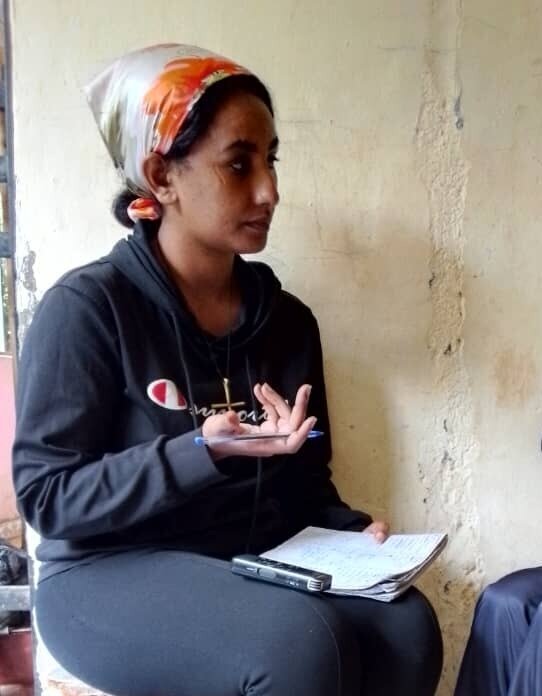The goal of a qualitative interview in research is to learn as much as possible about the experiences of the participants and to see the world from their perspective. Qualitative individual interviews are particularly helpful for probing delicate subjects that participants might not feel comfortable discussing in a group setting. Many times, the questions are flexible and open-ended, and new ones are created in response to the participant’s answers.
However, gathering qualitative data is difficult. It is time-consuming, prone to a high degree of subjectivity, biased due to leading questions, challenging to remain non-judgmental during discussion, and limited in data availability. Furthermore, an additional level of difficulty arises when the study focuses on sensitive subjects and vulnerable individuals.
Challenges in Researching Sensitive Topics
The primary factor that makes researching private and highly sensitive topics more challenging is that subjects may fear their secrets will be revealed, or that the people inflicting pain and suffering on them will be triggered more severely and impose more suffering than before. Subjects may also find it difficult to open up because recalling their past sufferings may cause them great stress and anxiety. This was evident during our interviews, where most participants cried while speaking about their experiences.
As part of the Adroit International Research Fellowship, I chose to study intimate partner violence, reproductive health outcomes, reproductive and maternal health system, and responsiveness among women living with disabilities in Southern Ethiopia.
Most available studies on intimate partner violence are conducted among the general women population. In developing countries, research on intimate partner violence against women with disabilities is essentially nonexistent. The first step in addressing social isolation and enhancing the lives of disabled women in developing nations is to comprehend the intimate partner violence experiences of these populations. Achieving the goal of leaving no one behind is crucial, yet there is a lack of sufficient data on this subject. These individuals have been disregarded and put in danger in the absence of targeted care and remedies.

I had to overcome numerous obstacles to collect data on intimate partner violence among women with disabilities. Intimate partner violence is particularly complicated since the perpetrator is often the victim’s spouse or intimate partner, who is assumed to be very knowledgeable about them and could jeopardize them if secrets are revealed. Even after becoming intimate with the participants, I frequently encountered refusals to be interviewed because most did not trust the confidentiality and were very suspicious due to their circumstances. This was the case even after reaching out through the disability association in the study area and having the association’s president persuade them of the study’s confidentiality.
The primary obstacle was that they preferred to be questioned in private settings, which were difficult to arrange. Another issue was accommodating the interviews with their schedules. One participant made an appointment with me at approximately 4:00 PM because, even though her husband was out of town, she feared someone could see us and inform him. Despite my best efforts to reassure participants of the privacy of our interview, it was very difficult for them to open up about their personal struggles. Additionally, it is often known that women with impairments are likely to be from low-wealth index families and are largely illiterate. When I attempted to contact them, they expected an offer from the interviewer and became discontented if I failed to fulfill their expectations.
Strategies for Building Trust and Collecting Data
Despite these difficulties, I overcame them by developing a deeper relationship with the participants through several methods. I first spoke with the president of the local disability association, the Disability Association of Southern Ethiopia, and submitted the legal letter of cooperation. His support was invaluable, as he helped me get to know the participants better and sometimes accompanied me to their living areas.
Another crucial strategy was adhering to the Declaration of Helsinki principles: ensuring confidentiality and privacy, discussing the potential harms and benefits of participating in the study, not recording personal details of the participants, and not obliging anyone to participate unless they agreed to do so. After providing written informed consent or having a trusted person dictate the consent for the participants, they became willing to participate. By having coffee with them, discussing broad current problems before the interview, and disclosing some personal information to strengthen our relationship, I was able to become more involved in their culture. This approach helped me obtain the information I needed and lessen the difficulties.
Conclusion
Conducting research on sensitive topics like intimate partner violence among women with disabilities requires cultural sensitivity and ethical considerations. Researchers have a responsibility to respect and protect participants’ rights and well-being.
In my experience, researchers must ensure that participants are fully informed about the study’s purpose, procedures, and potential risks and benefits. Informed consent should be obtained in a manner that is understandable and accessible to all participants, including those with disabilities. Additionally, researchers must be prepared to provide appropriate support and referrals for participants who may experience distress during the study.
Cultural sensitivity is another critical aspect of conducting research on sensitive topics. Researchers must be aware of and respect the cultural norms and values of the communities they are studying. This includes understanding the specific challenges faced by women with disabilities in different cultural contexts and adapting research methods accordingly. Involving local stakeholders, such as disability associations and community leaders, can help ensure that the research is conducted in a culturally appropriate manner and that the findings are relevant and actionable.
Building trust, ensuring confidentiality, and being mindful of the participants’ emotional state are crucial for successful qualitative research in sensitive areas. By prioritizing these ethical principles, researchers can gather valuable qualitative data while safeguarding the dignity and safety of vulnerable populations.
